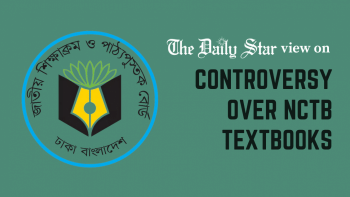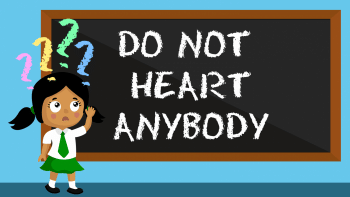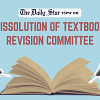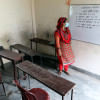New textbooks, same old errors

The first morning of the New Year comes with a special gift for millions of schoolchildren across the country, as they are handed new textbooks in a festive atmosphere. For the past 13 years, the education ministry has successfully distributed free school textbooks to all students from grade 1 to 10 to mark the start of a new academic year.
This year, the government started distributing about 35.16 crore textbooks to over 4.27 crore students. Undoubtedly, this is a great feat that has led to significant improvements in enrolment at primary and secondary levels. The government, especially the education ministry and National Curriculum and Textbook Board (NCTB), the state-owned publishing house looking after the printing and distribution scheme, deserve applause for delivering such a mammoth task without any major hiccups. It should be mentioned that the government has overhauled the curriculum, and textbooks of classes 1, 6 and 7 have changed accordingly. Students of other classes will also, in the next few years, receive books from the new curriculum.
But the students' joy and government's success have been overshadowed by a sizeable number of errors and anomalies in the textbooks, including structural and factual errors, outdated information, spelling mistakes and distortions of history. Such mistakes have, over the years, occurred repeatedly. However, the NCTB seems to be paying no heed to these controversies, which only damages the reputation of the textbook board and the government as a whole.
As a reporter covering education for over a decade, I have seen how journalists compete with each other over breaking stories on mistakes as soon as the new textbooks are distributed. This year has been no exception. A large portion of them appears to be printed on low-quality paper, with poor printing quality. And like in previous years, the mistakes in textbooks have triggered a barrage of criticism on social media.

For example, the English book for class 6 holds many grammatical errors and spelling mistakes, but the factual errors in the history book are far more shocking. A chapter of the book "Bangladesh History and World Civilisation" for class 9 and 10 gives the confusing information that the Pakistan army were engaged in torture, genocide and destruction in Bangladesh from March 26 to December 16, 1971. But the Pakistani army officially launched its campaign of genocide in erstwhile East Pakistan on the fateful night of March 25, 1971.
On page 200 of the same book, it is mentioned that Chief Justice Abu Sadat Mohammad Sayem presided over the oath-taking ceremony of Bangabandhu Sheikh Mujibur Rahman on Jan 12, 1972. But in reality, Justice Abu Sayeed Chowdhury had already been appointed as the country's president by then. Surprisingly, the book is based on the existing curriculum, which means these mistakes have been there for years.
Does this not speak of sheer callousness and irresponsibility on the part of the authorities concerned? Following criticisms, the NCTB in a statement on January 17 issued corrections to nine mistakes (including the aforementioned two) in three class 9 and 10 textbooks – History and World Civilisation, Bangladesh and Global Studies, and Civics and Citizenship – saying they would be sent to all schools in a day.
Sadly, this is not the first time such mistakes have been found. In 2013, when the government revised the curriculum, gross mistakes were found. In 2017, the government courted controversy by excluding write-ups and literary works of progressive authors and poets from textbooks following demands from Qawmi madrasa-based Islamist group Hefazat-e-Islam – a move that many believed to be a compromise to placate religious pressure groups. Despite massive criticism, the government still has no plans of bringing these write-ups back.
This year, apart from the mistakes, an embarrassing allegation of plagiarising content for a class 7 science textbook has been raised. Reportedly, a particular section of the first chapter of the book "Science: Investigative Study" was taken from the National Geographic website and translated into Bangla using Google Translate, which drew widespread criticism. Prof Dr Muhammed Zafar Iqbal and Prof Haseena Khan, who were involved in the writing and editing of the book, admitted that the allegations are true. In a statement, they accepted the responsibility as editors of the book, and assured that plagiarised sections and errors will be fixed in the next print edition.
The question is, who will take responsibility for the mistakes? It lies equally on the writers and editors, and the NCTB. The board follows several steps before printing textbooks. It has separate panels of writers and editors for two wings – primary and secondary. Once a book is written, officials (who are supposed to be skilled and experienced) in the editing wing examine the textbooks to find mistakes. Books are also sent to teachers of schools and colleges, and officials of education boards, for evaluation.
It is natural to question how the mistakes exist if all these steps were properly followed. We have learnt that the NCTB carries out this complex but very crucial job in a hurry, which leaves room for mistakes, and has even caught the notice of the High Court. The HC has summoned the NCTB chairman twice, most recently in November last year, to explain the mistakes and distortions of history in textbooks.
Regrettably, the textbook board appears to have not learned lessons from the past. What is more concerning is that we have not seen actions being taken against the persons responsible for the mistakes, except for transferring some officials in the past, even though handing textbooks riddled with errors and misinformation to the future generations of the country should be considered a grave offence.
The government needs to take a deeper look into the ills plaguing the NCTB, and ensure stern actions against the people responsible for feeding wrong information to children. It spends a huge amount of money every year to print and distribute textbooks to students – a tremendous amount of work that no other country in the world does. It must now investigate why a state-run institution is yet to achieve the capacity to carry out this work, even after so many years. It should also revisit the entire process of formulating curriculum and textbooks, and if need be, equip the board adequately with logistics and other facilities to deliver error-free textbooks to students. We cannot afford to see such mistakes in textbooks anymore.
Wasim Bin Habib is deputy planning editor at The Daily Star.

 For all latest news, follow The Daily Star's Google News channel.
For all latest news, follow The Daily Star's Google News channel. 










Comments